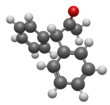Chemistry:1,1-Diphenylacetone
From HandWiki

| |||
|
| |||
| Names | |||
|---|---|---|---|
| Preferred IUPAC name
1,1-Diphenylpropan-2-one | |||
| Other names
1,1-Diphenylacetone
| |||
| Identifiers | |||
3D model (JSmol)
|
|||
PubChem CID
|
|||
| |||
| Properties | |||
| C15H14O | |||
| Molar mass | 210.276 g·mol−1 | ||
| Appearance | white solid | ||
| Melting point | 46 °C (115 °F; 319 K) | ||
| Boiling point | 307 °C (585 °F; 580 K) | ||
Except where otherwise noted, data are given for materials in their standard state (at 25 °C [77 °F], 100 kPa). | |||
| Infobox references | |||
Tracking categories (test):
1,1-Diphenylacetone is an organic compound composed of a benzhydryl group and a methyl group attached to a central carbonyl group.
Preparation
One method is where phenylacetone is dissolved in benzene, reacted with bromine to effect an α-keto bromination and stirred for 3-6 hours. Then this mixture is slowly added to a solution of anhydrous aluminium chloride in benzene to catalyze a Friedel-Crafts alkylation. A lengthy workup of the reaction mixture ends in recrystallization of the product 1,1-diphenylacetone from petroleum ether.[1]
References
- ↑ Schultz, Everett M.; Mickey, Sally (1949). "α,α-DIPHENYLACETONE". Organic Syntheses 29: 38. doi:10.15227/orgsyn.029.0038.
 |



